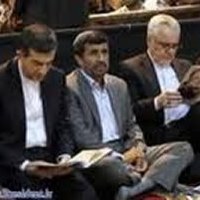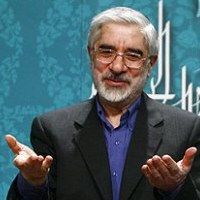![]()
Sun, March 20, 2011 | The Meir Amit Intelligence and Terrorism Information Center
Iran: Are the Events in the Arab World a Sign of the Mehdi’s Coming Return?
A documentary shown in Iran in the past several months has provoked a heated religious-legal debate. Titled “The Reappearance [of the Twelfth Imam] is Imminent” (“Zohur besyar nazdik ast”), the film has been distributed in hundreds of thousands of copies by a group calling itself “Harbingers of the Reappearance”. The group, which began its activity online in 2009, spreads Shi’ite messianic messages and claims that signs indicate that the Twelfth Imam (the Mehdi) will return soon.
“The Reappearance [of the Twelfth Imam] is Imminent” claims that the events that have taken place in the Middle East in recent years must be considered proof that the Mehdi will make his reappearance in the near future. While the distribution of the film began before the recent dramatic developments in the Arab world, the developments have fueled interest in the film and increased its circulation. The film’s creators indicate similarities between events that have taken place in the Middle East in recent years (such as the war in Iraq and developments in Lebanon and on the Palestinian scene) and events mentioned by various Shi’ite sources, portraying them as proof of the coming return of the Twelfth Imam. The film also draws parallels between the appearance of major political players in the Middle East (Ali Khamenei, Hassan Nasrallah, and Saudi Arabia’s King Abdullah) and characters whose appearance, according to Shi’ite sources, marks the Imam’s return (the 75-minute Persian-language film can be viewed at http://www.shiatv.net/view_video.php?viewkey=14974e7fd34f975ced5b).
The film’s wide distribution and the considerable interest in has generated have recently drawn criticism from traditional conservative circles in Iran’s religious Shi’ite establishment, which runs an aggressive campaign against expressions of popular Islam and messianic beliefs. Last weekend, the Messianism Center in the religious seminary in the city of Qom released a detailed memorandum which categorically rejects all the claims brought up in the movie.
The clerics argue that the film is based on weak, unreliable religious traditions and on unfounded sources of Islamic religious law, and that some of the claims brought up in the movie are not supported by any religious authorities. According to the memorandum, it is true that Ayatollah Ruhollah Khomeini, the founder of the Islamic revolution, stated that the Islamic revolution in Iran could be considered a first step in the process of the Imam’s return and a prelude to redemption. The attempt to predict the time of the Imam’s return based on current events, however, is a deviation from the principles of Shi’ite religious law. God alone has the power to determine the time of the Twelfth Imam’s return, and associating various events with signs allegedly showing that redemption is at hand is dangerous, since it may cast doubt among the believers over the principle of messianism.
The memorandum further states that only clerics, headed by the Religious Jurisprudent (Vali-ye Faqih, as the Supreme Leader is known in Iran) are authorized to express opinions on religious issues, including issues pertaining to the coming return of the Twelfth Imam. No other person has the authority to speak out on issues pertaining to the Imam’s return and toy with public sentiments on the basis of dubious, weak evidence. The clerics stress that, in accordance with the principles of Shi’ite faith, it is strictly forbidden to state the time of the Twelfth Imam’s return, and those who do so are necessarily liars. Arguments such as those brought up in the documentary, the clerics say, serve the Shi’ites’ Christian and radical Jewish enemies, who also seek to lay the foundations for an apocalyptic war and for the return of the messiah in accordance with their faith (www.mahdi313.org).
Websites affiliated with the traditional conservative bloc have also strongly criticized the film’s distributors, accusing them of straying from the principles of Shi’ite religious law. The anticipation of the Imam’s return is a major principle in Shi’ite Islam, and every Shi’ite believer longs for his return, say the critics of the film. Creating false expectations among the public about the time of the Mehdi’s return (such as by distributing movies about the issue) is harmful, however, and compromises the mental preparation of the public for the day of the Imam’s return (www.yalsarat.com, March 6).
One example of the view which considers the developments in the Arab world a sign of the Mehdi’s imminent return could be seen in a Friday sermon given by senior cleric Ayatollah Mohammad Emami-Kashani, who claimed that the uprisings in the Arab world and the massacres of citizens by their tyrannical rulers may be considered signs of the Mehdi’s return according to Shi’ite religious-legal literature (Fars, March 11).
In recent years, the Iranian regime has been involved in an intensive campaign to tighten control over religious expressions that are incompatible with the official interpretation held by Iran’s current religious leadership and with the concept of “rule of the religious jurisprudent”. Any view that may potentially threaten the status of Iran’s clerics and allows a religious commentary that does not depend on the religious institution is considered a theological, ideological, and political threat to the regime and the Supreme Leader’s status.
The campaign to increase control over the religious life in Iran is also reflected in the intensifying struggle against expressions of popular Islam and Shi’ite messianism, suppressing Sufi orders, and curtailing the freedom of clerics who question the concept of “rule of the religious jurisprudent”. Part of the escalating struggle against messianism also has to do with the conduct of President Mahmoud Ahmadinejad, who frequently makes reference to the possibility of the Vanished Imam’s return. Ahmadinejad’s messianic views have been strongly criticized by leaders of the religious establishment and his critics in the conservative bloc.



 RSS
RSS


















#Iran: Are the Events in the #Arab World a Sign of the #Mehdi’s Coming Return? | #Shiism http://j.mp/g6KMbo
RT @CrethiPlethi: #Iran: Are the Events in the #Arab World a Sign of the #Mehdi’s Coming Return? | #Shiism http://j.mp/g6KMbo